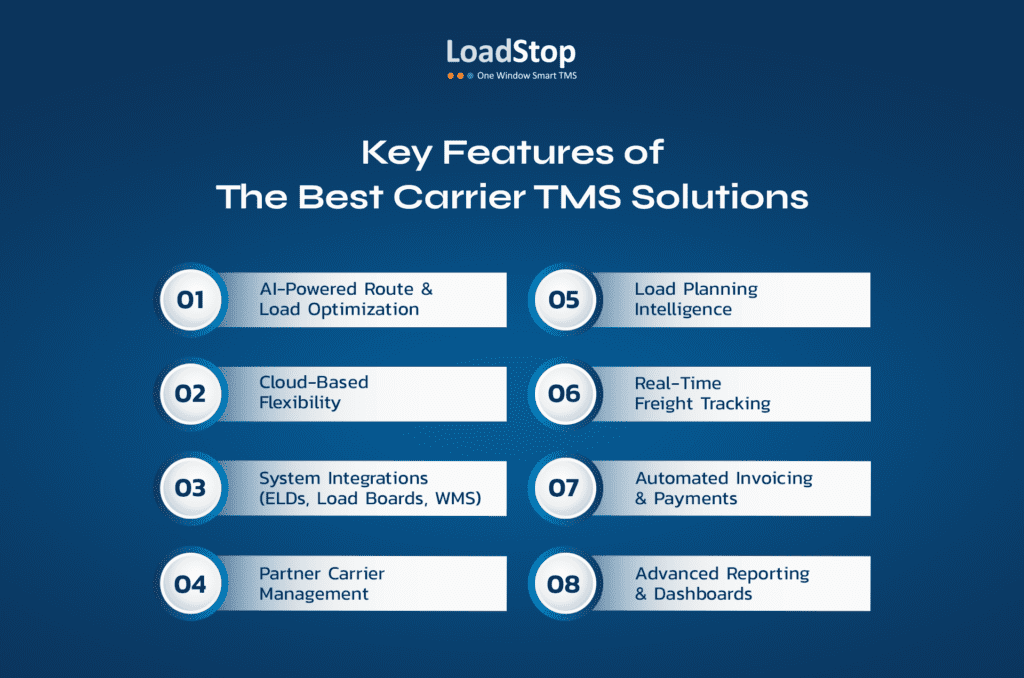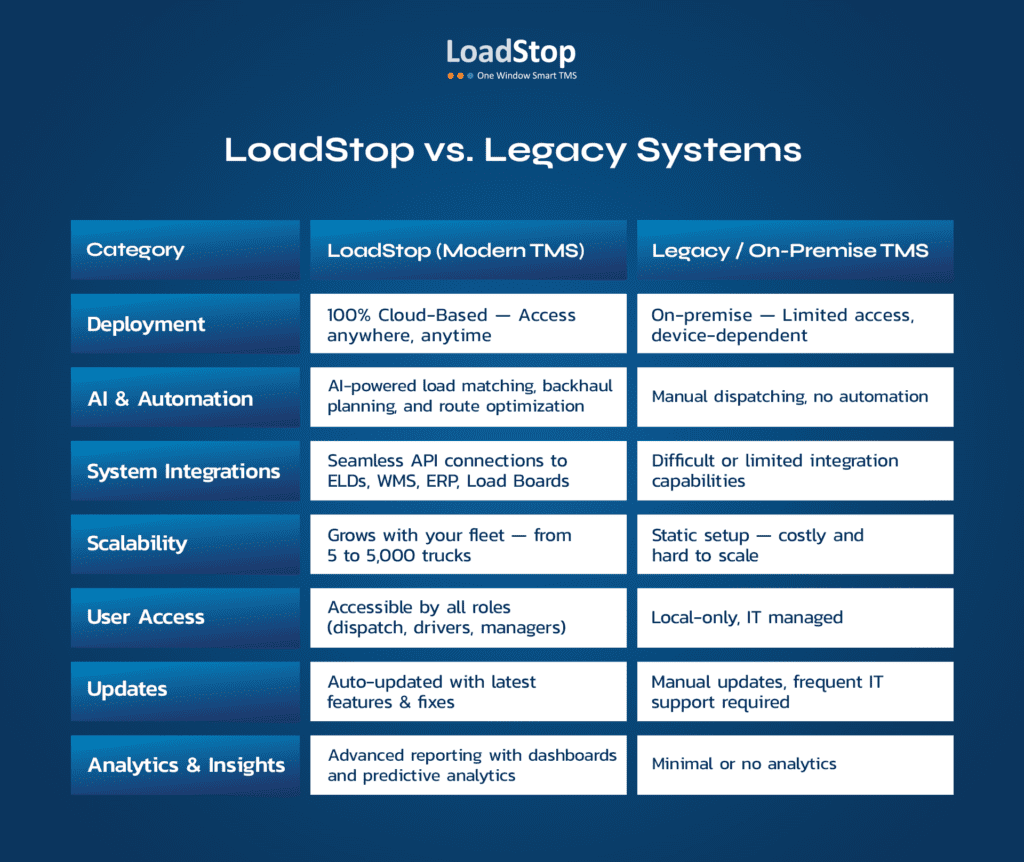Are you still using spreadsheets, phone calls, and gut instinct to manage your trucking operations? That might have worked in the past, but in today’s fast-paced freight industry, inefficiencies can cost you loads, miles, and money. To maintain customer satisfaction, you, as a truckload carrier, must balance load allocations, fuel expenses, deadhead miles, driver schedules, and compliance documentation. Operating manually or with antiquated systems can put you at a significant disadvantage in a field where every second matters.
These days, trucking companies require a sophisticated, automated system that optimizes loads, simplifies carrier selection, and increases profitability—not just dispatch tools. With real-time load visibility, AI-powered route planning, and smooth connectivity with freight marketplaces, partner carrier networks, and financial systems, a truckload carrier TMS accomplishes just that.
There has never been a greater demand for a best-in-class carrier TMS due to growing competition, more rules, and rising fuel prices. Whether you are a corporate carrier, mid-sized fleet, or owner-operator, a contemporary TMS for carriers aids in cost reduction, load planning improvement, and the elimination of inefficiencies.
What is a carrier TMS and why does it matter?
Carrier Transportation Management System (TMS) is a specialized software made to help carriers manage and optimize the many aspects of transportation logistics. Processes including order administration, route planning, carrier selection, shipment tracking, and freight payment are all integrated and automated by one unified platform.
A TMS improves operational efficiency, lowers manual error rates, and offers real-time visibility into transportation processes by combining these services. Route optimization features contribute to significant cost savings by improving asset usage and lowering fuel costs; some businesses have experienced a 15% decrease in transportation expenses following the implementation of a TMS.
Who benefits from using Carrier TMS software?
Many parties involved in the transportation and logistics industry benefit from carrier TMS software, including:
Trucking Companies: Increase fuel economy, minimize empty miles, and optimize load assignments. Improve carrier selection procedures and improve shipment management, and freight brokers.
Third-Party logistical Providers (3PLs): Enhance service offerings and manage intricate logistical processes. Shippers: Increase delivery efficiency and better control over transportation expenses.
Key features of the best carrier TMS solutions
A carrier TMS is more than just a digital dispatch board. Being a powerful, data-driven platform it improves the carrier selection to maximize profitability. Because the transportation industry is becoming more competitive, having scalable and intelligent TMS features will help you to grow:

1. AI-powered automation for smarter decisions
Logistics is being evolved by artificial intelligence (AI), and a top-tier carrier TMS uses AI to boost operational effectiveness. AI-driven route optimization suggests the most economical routes by taking into account current traffic, weather, and fuel economy. Algorithms for load planning automatically pair the best vehicles with available freight, minimizing deadhead miles and increasing load capacity.
Real-time data analysis also aids carriers in making decisions that are proactive as opposed to reactive. Carriers can adjust capacity by using predictive analytics to predict changes in demand. Trucking businesses may drastically cut down on operating expenses and downtime by automating scheduling and fuel efficiency.
2. Cloud-based convenience vs. On-premise TMS
Traditional on-premise systems are being quickly replaced by cloud-based carrier TMS software because of their scalability, flexibility, and cheaper initial costs. Fleet managers and drivers may access data from any device, anywhere, with a cloud-based TMS, guaranteeing smooth communication and real-time updates. Additionally, it easily interfaces with third-party programs like freight marketplaces, accounting software, and ELDs.
On the other hand, manual updates, costly hardware, and IT upkeep are necessary for on-premise TMS solutions. The agility required in the fast-paced freight industry of today is absent from these antiquated systems. Modern trucking operations require automatic upgrades, improved security, and data backup, all of which are provided by cloud-based Truckload Carrier TMS solutions.
3. Integration with existing systems
GPS tracking, freight broker platforms, ERP systems, and dispatch software must all be smoothly integrated with a carrier TMS. This reduces errors and needless manual entry by ensuring real-time data synchronization across departments.
TMS carrier selection solutions facilitate API-based integration, which enables effective communication between many systems for trucking companies that depend on multiple platforms. When implementing a new TMS, this compatibility enhances operational continuity, facilitates transfers, and minimizes downtime.
4. Enhanced load and partner carrier management
By streamlining the partner carrier selection and administration process, a truckload carrier TMS improves teamwork. Businesses may engage with the best partner carriers while lowering administrative burdens by automating load assignments, compliance tracking, and carrier verification.
Carrier TMS systems contribute to the elimination of paperwork through contract automation and digital agreements, guaranteeing speedier negotiations and smooth freight transactions. 3PLs and big carriers that deal with several subcontractors may find this functionality especially helpful.
5. Load planning for the arrangement of goods
A key component of transportation management is load planning, which entails the thoughtful placement and arrangement of items inside a cargo. By considering variables like weight distribution, vehicle capacity, and route optimization, TMS uses complex algorithms to identify the best method for loading cargo onto vehicles. This feature maximizes cargo capacity and lowers transportation costs by minimizing vacant spaces inside vehicles. By maximizing vehicle utilization, effective load planning also helps to lower carbon footprints overall.
6. Executing the automation
Because TMS automates and coordinates the entire transportation process, it performs exceptionally well throughout the execution phase. It makes it easier for shippers, carriers, and consignees to communicate in real-time with one another.
Schedules are followed, scheduled routes are followed, and any deviations or disturbances are dealt with right away thanks to this automation. TMS dramatically lowers the possibility of errors by automating repetitive processes and minimizing manual interventions, which results in more dependable and seamless transportation execution.
7. Freight tracking capabilities
TMS’s strong freight tracking features enable real-time visibility, which is revolutionary in the transportation industry. Cutting-edge TMS platforms use technologies like GPS and IoT to track shipments’ location and status in real-time.
This facilitates proactive decision-making in the face of unforeseen circumstances, such as delays or detours, in addition to improving transparency for all parties involved. Maintaining accountability, fulfilling delivery deadlines, and giving clients accurate, current information on their shipments all depend on freight tracking.
8. Easier payment processing for invoices
The seamless operation of transportation operations depends on efficient financial transactions. Through the automation of billing, settlement, and invoicing procedures, TMS enables smooth payment processing.
It ensures accuracy and transparency in financial transactions between shippers and carriers by streamlining the freight charge reconciliation process. TMS reduces the possibility of mistakes, disagreements, and payment cycle delays by automating payment procedures. In addition to improving carriers’ cash flow, this strengthens and solidifies relationships throughout the transportation network.
9. Reporting and data-driven insights for strategies
When it comes to optimizing mobility strategy and making well-informed decisions, data-driven insights are important. TMS is excellent at producing thorough reports that provide an in-depth understanding of a range of transportation performance factors.
Commonly monitored KPIs include carrier performance, cost per mile, on-time delivery, and overall supply chain efficiency. These reports give companies the ability to spot patterns, evaluate how well transportation plans are working, and make data-driven choices for ongoing development. Furthermore, reporting features help to improve overall responsibility in the transportation process, meet regulatory standards, and provide documentation for audits.
Why LoadStop is the premier TMS for carriers
To keep your trucks operating at maximum efficiency, reduce expenses, and optimize operations, you need a clever, scalable, and completely integrated system. Developed with truckload carriers in mind, LoadStop is a cutting-edge cloud-based carrier TMS driven by AI that streamlines partner carrier management, load planning, and real-time tracking.

You can increase profitability, cut down on empty miles, and obtain total operational insight using LoadStop’s Carrier TMS software. Let’s explore further why LoadStop is the leading carrier TMS for contemporary trucking companies.
1. AI-powered load optimization
Every trucking company is aware that wasted mileage translates into lost profits. Your trucks will always travel with a profitable load thanks to LoadStop’s AI-driven load optimization, which lowers deadhead miles and boosts your bottom line.
- Intelligent load matching: LoadStop’s AI algorithms intelligently pair available trucks with the highest-paying freight according to factors including load type compatibility, fuel efficiency, and route efficiency.
- Real-time optimization: To optimize revenue, dynamic load planning algorithms constantly adapt to fuel prices, traffic patterns, and driver availability.
- Automated backhaul planning: To guarantee that your trucks are never empty, the system finds backhaul opportunities.
2. Cloud-based & scalable
Conventional on-premise TMS solutions are expensive, inflexible, and in need of ongoing IT support. Because LoadStop is entirely cloud-based, you can access your operations in real time from any location and on any device.
- No hardware costs: Since everything is safely saved in the cloud, there is no need to maintain pricey servers.
- Automatic updates: Never miss out on the newest features without having to manually install them or deal with outages.
- Scalability for expanding fleets: LoadStop expands with your company, guaranteeing smooth growth without system lags, regardless of how many trucks you have—five or five thousand.
- Constant accessibility: LoadStop is accessible from any device by dispatchers, fleet managers, and drivers, guaranteeing constant data flow and communication.
3. Smooth integrations
Making sure a new carrier TMS works seamlessly with its current tools and software is one of the main obstacles carriers encounter when implementing it. This worry is removed by LoadStop thanks to its strong API-based connections, which easily link with:
- Freight markets and load boards: They provide quick access to lucrative freight opportunities.
- ELDs with telematics: Monitor driver conduct, fleet performance, and compliance in real time.
- Accounting and payroll systems: Automate tracking of expenses, driver payouts, and invoices.
- ERP & Warehouse Management Systems (WMS): Ensure seamless logistics and supply chain operations.
4. Carrier selection and collaboration
For freight brokers, 3PLs, and large carriers, working with partner carriers is a crucial part of expanding operations. LoadStop’s Partner Carrier Program simplifies carrier vetting, collaboration, and contract management.
- Instant carrier matching: Quickly find and select the most reliable partner carriers based on performance, rates, and compliance history.
- Automated onboarding & compliance tracking: Ensure every partner carrier meets safety, insurance, and operational standards before assigning loads.
- Real-time communication & collaboration: LoadStop provides a centralized platform for digital contract management, instant messaging, and automated load assignments.
5. Advanced reporting and analytics
Data is power in the transportation industry. LoadStop’s sophisticated analytics engine helps carriers make data-driven decisions that increase productivity and profitability by converting complicated logistical data into actionable insights.
- Profitability analysis: To optimize earnings, obtain comprehensive revenue reports, cost per mile, and fuel economy.
- Fleet & driver performance tracking: To improve performance, keep an eye on delivery schedules, driver conduct, and compliance documentation.
- Market patterns & predictive analytics: You can predict fuel patterns, freight demand, and price changes with the aid of AI-powered forecasts.
- Custom dashboards & reports: Automate report generation and customize analytics to meet your company’s needs.
The future is digital, adopt a carrier TMS now
The era of manually dispatching loads, using spreadsheets, and making lengthy phone calls is ended. The business is being revolutionized by carrier TMS software, which enables carriers to automate processes, cut expenses, and increase revenues. You’re losing out on possibilities and money if your company isn’t utilizing a truckload carrier TMS.
LoadStop, a powerful carrier TMS solution, is more than just a tool; it’s a strategic partner that helps your fleet operate more efficiently. With AI-powered automation, seamless integrations, real-time analytics, and cloud-based flexibility, the right TMS ensures you stay ahead in an increasingly competitive market.
So, how do you choose the best Carrier TMS for your business? Look for a solution that is scalable, easy to integrate, and designed to adapt to the evolving demands of the trucking industry. LoadStop checks all these boxes and more—giving you the power to streamline operations, boost efficiency, and drive sustainable growth.
Stop chasing loads, and take control of your fleet.
FAQs
Truckload carriers, freight brokers, and logistics companies want to streamline operations, improve load planning, and reduce costs.
AI-powered automation, IoT-driven fleet tracking, blockchain for secure transactions, and advanced analytics are shaping the future of TMS technology. Tools like LoadStop ensure to provide advanced AI features to help carriers run their businesses more efficiently.
Cloud-based TMS offers remote access, automatic updates, and better scalability, while on-premise TMS requires manual maintenance and real-time accessibility. Hence the reason, LoadStop is one of the best AI TMS that helps carriers to track, load, automate and do a lot more using a single dashboard.



